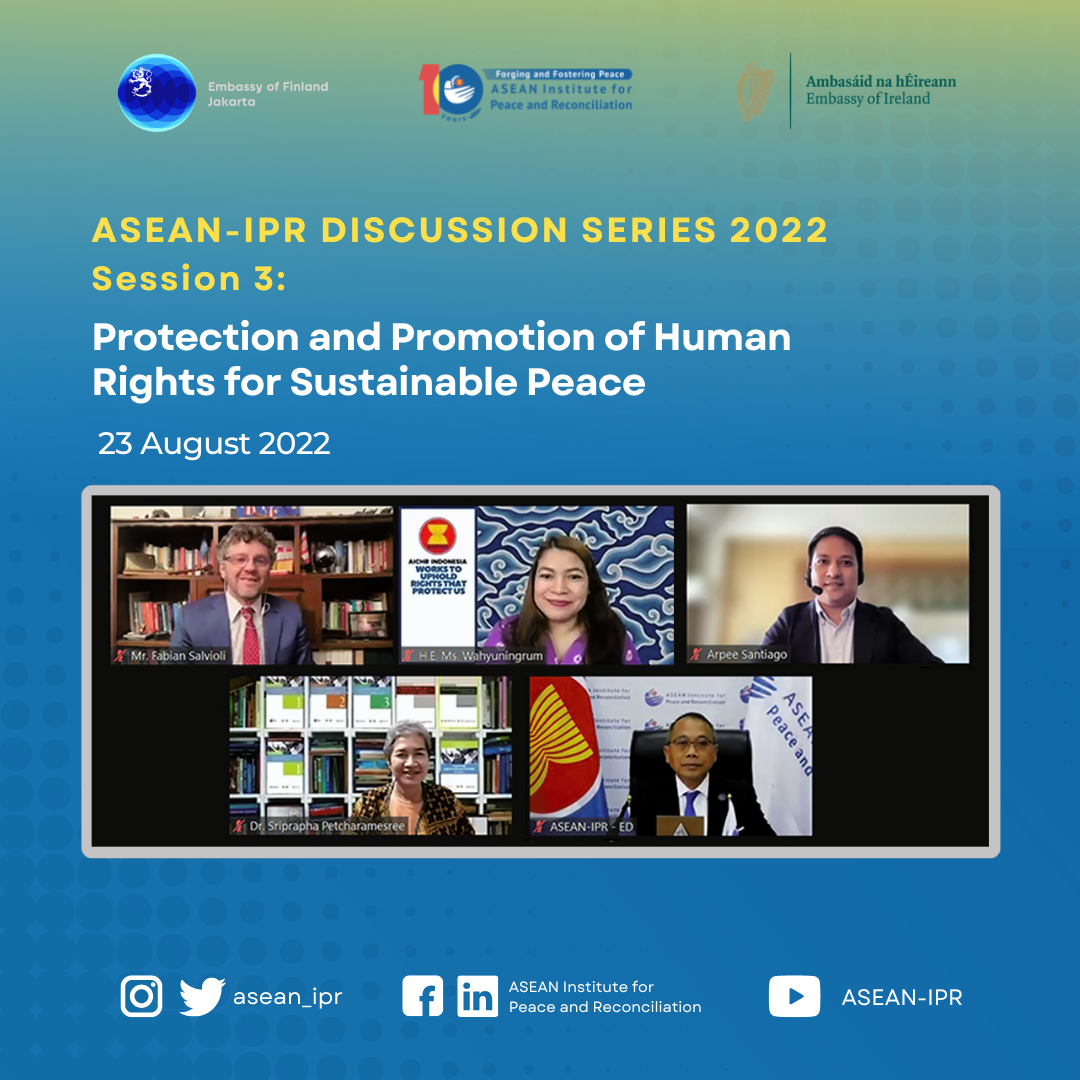ASEAN-IPR Discussion Series 2022 Session 3: "Protection and Promotion of Human Rights for Sustainable Peace”
ASEAN-IPR DISCUSSION SERIES 2022
Session 3: "Protection and Promotion of Human Rights for Sustainable Peace"
Tuesday, 23 August 2022
Over 125 participants attended the third session of the ASEAN Institute for Peace and Reconciliation (ASEAN-IPR) Discussion Series 2022, with the theme "Protection and Promotion of Human Rights for Sustainable Peace" that was conducted on 23 August 2022 through virtual webinar platform and the Institute's YouTube Channel. This year's Discussion Series is organised in conjunction with the Institute's 10th Anniversary commemoration. Seeing that human rights violations could simultaneously be the cause, trigger, and result of violence and conflict, it is undeniable that human rights are essential elements to be discussed in order to achieve sustainable peace.
In his opening remarks, the Executive Director of ASEAN-IPR, H.E. I Gusti Agung Wesaka Puja, drew upon various past ASEAN statements, such as the Joint Communique of the 26th ASEAN Ministerial Meeting 1993 and the Cha-am Hua Hin Declaration on the Intergovernmental Commission on Human Rights 2009, which places emphasis on protection first, before the promotion of human rights. It is therefore pertinent that protection and promotion of human rights must be put forth in order to have sustainable peace in the region.
The session was moderated by Atty. Ray Paolo J. Santiago (Executive Director, Ateneo Human Rights Center). Three experts with insights from inside and outside the region were invited as resource persons, namely: Mr. Fabian Salvioli (Special Rapporteur on the Promotion of Truth, Justice, Reparation, and Guarantees of Non-Recurrence, OHCHR), H.E. Wahyuningrum (Representative of Indonesia to the ASEAN Intergovernmental Commission on Human Rights (AICHR)) and Dr. Sriprapha Petcharamesree (Advisor, Institute of Human Rights and Peace Studies, Mahidol University). Each speaker shared their perspective and understanding towards the ways human rights should be protected and promoted by looking at how universal human rights norms can be appropriately translated at regional and national levels, particularly in cases of post-conflict situations. In the Discussion, speakers emphasised the necessity for human rights protection in order to achieve sustainable peace while exploring the linkages between them.
With the interchangeable relationship between sustainable peace and protection of human rights in mind, the discussion looked at best practices to align peace agenda and human rights. Special Rapporteur Fabian Salvioli underlined, 'there is no peace without human rights and there is no human rights without peace'. Focusing on the three dimensions of human rights protection and promotion mechanism, namely international, regional, and national levels, the discussion highlighted the five elements in human rights mechanisms that are essential in transitional society to move on to the future while simultaneously acknowledging the past. These five elements are truth, justice, reparation, guarantee of non-recurrence, and memorialisation.
Moreover, discussions deliberated ASEAN mechanisms in protecting and promoting human rights in the region and analysed the meaning of the 'right to peace', as stipulated in Article 38 of the ASEAN Human Rights Declaration (AHRD). It is understood that 'peace' is a precondition to enable other rights to be fulfilled. It enables individuals and groups to enjoy civil, political, economic, social and cultural rights. By acknowledging the obstacles it faces, namely how human rights are often perceived as a stumbling block in achieving peace and how issues pertinent to human rights become subject of politicisation, the ASEAN Intergovernmental Commission on Human Rights (AICHR) as ASEAN's human rights body is required to be creative in its work. Some of the AICHR activities outlined in the discussion, such as setting up a complaint mechanism, discussion on the right to remedy, etc., are products of creativity in interpreting their mandate, with the objective to accommodate grievances submitted by the public and to uphold the protection of human rights.
If you missed this session, head on to the ASEAN-IPR's YouTube channel to see the whole session's recording. Be sure to subscribe to our YouTube channel, check out our website and follow our social media for the latest information and/or updates on our activities. Stay tuned for the last sessions of the Online Discussion Series 2022.
*******




